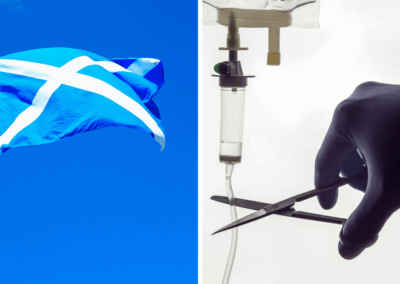The Scottish Parliament has passed a financial resolution to the Scottish assisted suicide Bill that would hand a “blank cheque” to implement assisted suicide, with funding likely to have to be diverted from other services to pay for this.
The Assisted Dying for Terminally Ill Adults (Scotland) Bill, at Stage 2 in Holyrood, would legalise assisted suicide for someone who is aged 16 or over, deemed mentally capable, ordinarily resident in Scotland, and terminally ill. There is no prognosis requirement specified.
Due to the likely large expenditure required by the implementation of assisted suicide, the Bill was required to be subject to a financial resolution before it could progress to the next Parliamentary stage.
Following a short and unexpected debate, the Scottish Parliament agreed to a motion giving permission for “any expenditure” whatsoever linked to the design of the Bill.. Pam Duncan-Glancy, MSP for Glasgow, the first permanent wheelchair user in the Scottish Parliament, said that the financial resolution “is in effect a blank cheque to make it easier to choose to die than to live”.
“Scottish hospices have said that, if assisted dying is legalised, hospices could see their fundraising efforts impacted”, she continued. “The Royal College of Psychiatrists in Scotland said that it did not think that costs could be absorbed within existing budgets. The Royal College of General Practitioners said that ‘Trying to add it on to a busy general practice would be very difficult’”.
She continued, “I have not touched on the crisis in social care, which sees staff on low pay, and disabled people having to rely on incontinence pads for hours because there is no money to pay staff to go in often enough to change them; or the housing crisis, which sees 10,000 disabled people stuck in their own homes; or the fact that one in four people who need palliative care in Scotland does not get it. What would the costs of the bill mean for the opportunities to address all of that?”
Jeremy Balfour, MSP for Lothian, agreed, saying, “As we are often told by the Scottish Government … we have a fixed budget. That money will have to come from somewhere”.
Balfour asked whether MSPs “acknowledge that some other service, whether it is education, another health service or transport, will be affected if the financial resolution is passed?”
Douglas Ross MSP said he could not vote to give money tofor a regime he did not agree with. “I just want to be consistent in the way that I vote on the bill. I did not support it at stage 1, I do not believe that it is correct, and I therefore think that it would be hypocritical of me to vote to put money behind a bill that I do not support”, he said.
Edward Mountain MSP agreed, saying “[T]he financial memorandum is in effect a blank cheque that is being written by the Government, which is saying that it will cover whatever the bill costs. I wish that that was the case when it comes to palliative care, because we know that palliative care is not correctly funded”.
Scottish Government confirms assisted suicide would “inevitably” impact other health and social care services
This comes as Neil Gray MSP, the Cabinet Secretary for Health and Social Care, recently confirmed that funding for the implementation of assisted suicide in Scotland would have to come from other services.
In a response to a letter written by Clare Haughey MSP, the Convener of the Health, Social Care and Sport Committee, Gray said “the costs associated with staff training – including staff time to undertake assisted dying-related training – would necessitate a degree of reprioritisation and would inevitably have implications for other services”.
He continued, “More generally, we remain deeply concerned about the financial implications of the Bill”. The memorandum on financial implications associated with the Bill, as provided by the Bill’s key sponsor, “significantly underestimates the costs associated with implementation”, Gray said.
Duncan-Glancy, during the debate, said “whatever the costs of that are in the end, it means money diverted away from services that are designed to support constituents to live well to a service that makes it easier for them to choose to die”.
“The bill is proposed in a context in which the NHS is in crisis, social care is creaking at the seams and one in four people do not get the palliative care that they need. To change that context, we need fundamental changes in health and social care, housing and much more to improve the lives of our constituents. Spending money—a lot of it, according to evidence—on assisted suicide reduces money for other areas”, she argued.
“No matter how hard or intolerable life can be, there must always be hope for a better world – one where we have the right to practical assistance and support to lead ordinary lives”.
The Assisted Dying for Terminally Ill Adults (Scotland) Bill passed Stage 1 by only 14 votes in May this year. This means only seven MSPs need to change their vote for the Bill to fall at the final (Stage 3) vote. 21 MSPs have been identified as “waverers” – those who initially voted for the Bill but have indicated they could vote against the Bill at the final vote at Stage 3.
In England and Wales, the separate assisted suicide Bill has also been granted a ‘blank cheque’ amid an outcry from MPs concerned about cost implications in an underfunded palliative care sector.
Spokesperson for Right To Life UK, Catherine Robinson, said “It is disappointing that the Scottish Parliament passed the financial resolution to the assisted suicide Bill yesterday. This Bill gives a blank cheque to cover the implementation of the legislation, to the detriment of other important health and social care services. “.
“The priority for the Government should be to legislate for the adequate provision of care to all those who need it, not reducing funding for some services so that they can legislate for the ending of lives. Members of the Scottish Parliament should come together to reject this harmful Bill”.












